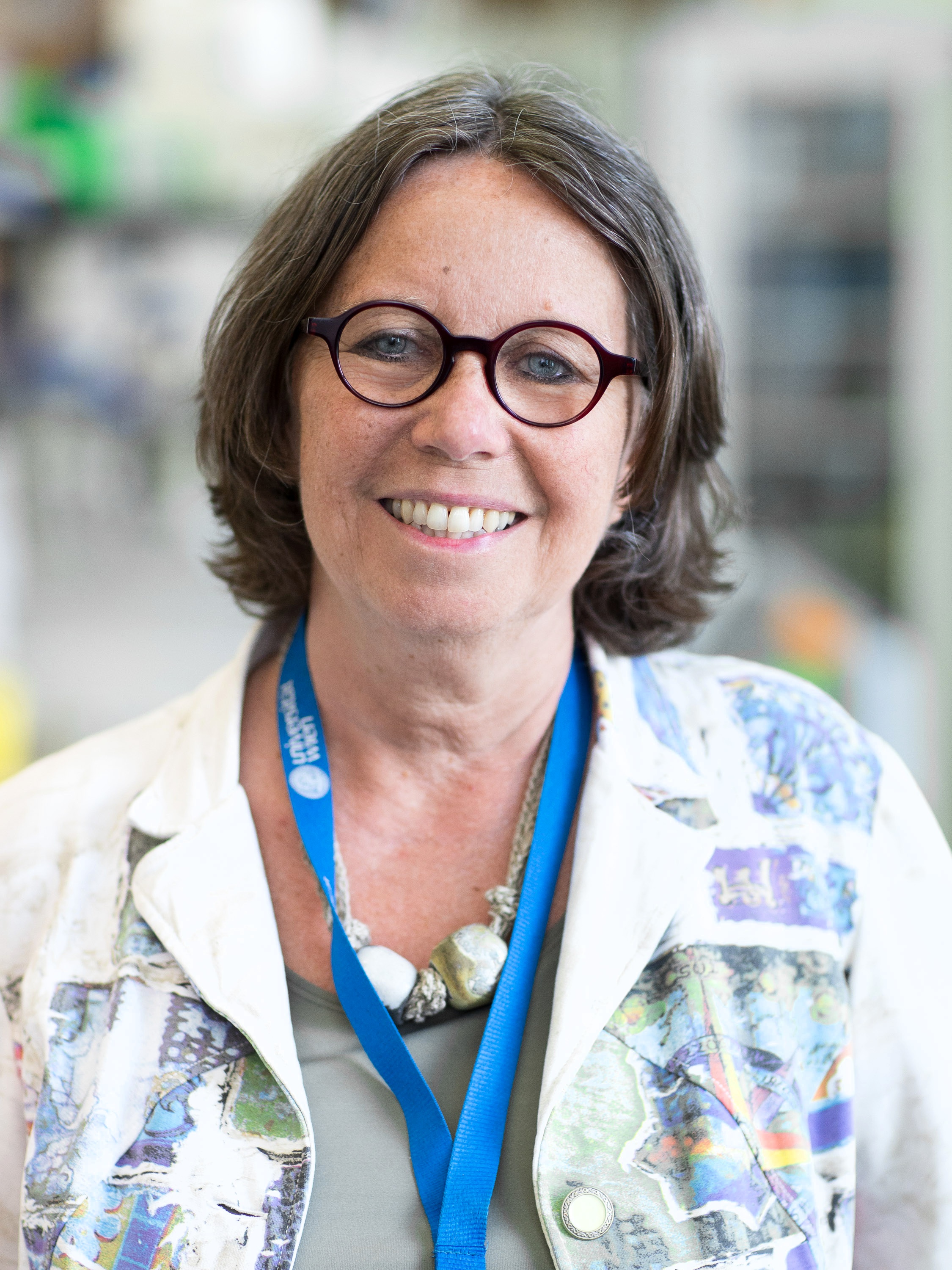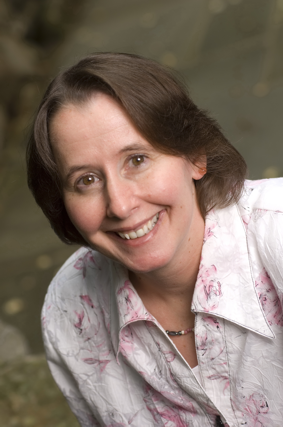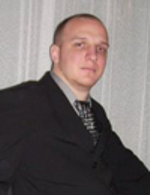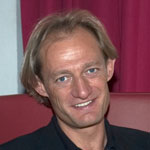Keynotes at ICCHP: "Brainfood for AT and eAccessibility"
ICCHP presents outstanding talks with the potential to raise awarenes for new domains and to open new perspectives for researchers and practitioners in AT and eInclusion. The keynote speeches should make the field of eInclusion reflect and rethink its own practice. They should be provoking and motivating to look accross traditional borders of disciplines.
ICCHP 2016 proudly presents to following keynote talks:
- Renée Schröder, Dept of Biochemistry and Cellbiology, Max F. Perutz Laboratories, University of Vienna: The Evolution of Responsibility in the Anthropocene
- Therese Willkomm, University of New Hampshire: Low Cost Assistive Technology Solutions for Everyday Living, Learning and Working
- Johannes Hund, Siemens Germany: Internet and Web of Things
- Alois Ferscha, Johannes Kepler University, Linz: May I Have Your Attention, Please?
- WAI/W3C Keynote Panel: Web of Things
Renée Schröder, Dept of Biochemistry and Cellbiology, Max F. Perutz Laboratories, University of Vienna:
The Evolution of Responsibility in the Anthropocene
 Abstract. 70.000 years ago, the human brain experienced a significant development in the quality of its potential: homo sapiens was suddenly able to think about things that don’t exist and to invent all kind of tools to escape the harsh pressure of evolutionary selection. I want to argue that from this time on, homo sapiens is escaping the path of natural evolution and becoming responsible for its own fate. Homo sapiens is shaping not only himself but more and more his environment and the whole planet leading to a new era coined the „Anthropocene“. This term was suggested by Paul Crutzen and Eugene Stoermer in 2000, as the epoch in which human activities started to have a significant global impact on the Earth’s ecosystem, including the atmosphere and the geosphere. More recently technologies in molecular genetics are being invented that make it possible to manipulate the genomes of living organism like plants and animals and even of humans in a more precise and efficient was way than before. This might be the beginning of the end of the era of genetic diseases but this might also mean that we humans will create new species to satisfy our ideological demands.
Abstract. 70.000 years ago, the human brain experienced a significant development in the quality of its potential: homo sapiens was suddenly able to think about things that don’t exist and to invent all kind of tools to escape the harsh pressure of evolutionary selection. I want to argue that from this time on, homo sapiens is escaping the path of natural evolution and becoming responsible for its own fate. Homo sapiens is shaping not only himself but more and more his environment and the whole planet leading to a new era coined the „Anthropocene“. This term was suggested by Paul Crutzen and Eugene Stoermer in 2000, as the epoch in which human activities started to have a significant global impact on the Earth’s ecosystem, including the atmosphere and the geosphere. More recently technologies in molecular genetics are being invented that make it possible to manipulate the genomes of living organism like plants and animals and even of humans in a more precise and efficient was way than before. This might be the beginning of the end of the era of genetic diseases but this might also mean that we humans will create new species to satisfy our ideological demands.
What I want to discuss is the fact that we, homo sapiens, need to realize that by doing all this, we are becoming more and more responsible for what is happening on our planet. Only high level education for every body will enable us find the solutions to shape our future in a sustainable way.
Short CV. Max F. Perutz Laboratories, Department of Biochemistry, Univ. of Vienna, Dr. Bohrgasse 9, A-1030 Vienna, Austria; http://www.mfpl.ac.at/mfpl-group/group/schroeder.html, http://www.dashennei.net
Born on May 18, 1953 in Brazil, PHD in Biochemistry and Habilitation in Genetics at Univ. of Vienna, Austria.
- Fellowships
- 1980: EMBO short term fellowship to Munich, (group of Prof. R.J. Schweyen)
- 1982/85: EMBO long-term fellowships to C.G.M. /C.N.R.S. France (Prof. P. P. Slonimski)
- 1987/89: Erwin Schroedinger Fellowship to Albany,NY, USA (Prof. Marlene Belfort)
- Positions
- 1986: Assistant at the University of Vienna, Institute of Microbiology and Genetics
- 2005: Head of the Department of Biochemistry, Max F. Perutz Laboratories, Univ. Vienna
- 2006: Professor of RNA-Biochemistry, University of Vienna
- Awards
- 1984: Theodor-Körner Stiftungspreis für Wissenschaft und Kunst
- 1992: SANDOZ "Forschungspreis für Biologie"
- 1997: Elected member of EMBO
- 2001: L'Oréal UNESCO Special Award for Women in Science
- 2002: Elected Austrian Scientist of the Year by Science Journalists
- 2003: Elected Full Member of the Austrian Academy of Sciences
- 2003: Wittgenstein award
- 2005: Prize of the city of Vienna for “Natur- und Technische Wissenschaften”
- 2006: „Großes Ehrenzeichnen für Verdienste um die Republik Österreich“
- 2007: „Frauenpreis“ of the City of Vienna
- 2011: Eduard Buchner Preis
- 2012: Science Book of the Year by the Austrian Public for “Die Henne und das Ei”
- 2015: Goldenes Ehrenzeichen für Verdienste um das Land Wien
- Other Activities
- 1998-2004: Austrian delegate to the EMBC
- 1999-2002: Head of the commission for the studies of molecular biology
- 2001-2005: Member of the Austrian Commission for the Bioethics
- 2002-2007: Member of the board of trustees of the WWTF
- 10/2004- 9/2006: Vice-Dean of the Life Science Faculty of the University of Vienna
- Sept 2005 – May 2010: Vice President of the Austrian Science Fund (FWF)
- 2010.2195: Member of the Austrian Research Council
- since 2010: Coordinator of the VIPS postdoctoral program at MFPL
- since March 2007: Editor in chief of “RNA biology”
- since 2015: President of IWF-Austria
Therese Willkomm, University of New Hampshire:
Low Cost Assistive Technology Solutions for Everyday Living, Learning and Working
 Abstract. Thousands of assistive technology solutions for education, employment and community living can be created in minutes by everyone. Now, more than ever, individuals who experience various disabilities need immediate solutions to everyday challenges. The average person who experiences a disability needs 13 different assistive technology devices. This presentation will inspire you to look at everyday challenges and quickly overcome them using ordinary items in extraordinary ways. This presentation will also discuss how these assistive technology solutions embrace the key principles of universal design for learning, living, and working. Assistive technology can benefit everyone and not just the person who experiences a disability in creating maximum independence and productivity for all. This session will also discuss feature mapping of apps and software that can be used by individuals who experience intellectual, vision, communication or physical impairments. Learn how feature mapping of apps to accommodate for specific disabilities will continue to dictate which apps and software now and in the future will be purchased.
Abstract. Thousands of assistive technology solutions for education, employment and community living can be created in minutes by everyone. Now, more than ever, individuals who experience various disabilities need immediate solutions to everyday challenges. The average person who experiences a disability needs 13 different assistive technology devices. This presentation will inspire you to look at everyday challenges and quickly overcome them using ordinary items in extraordinary ways. This presentation will also discuss how these assistive technology solutions embrace the key principles of universal design for learning, living, and working. Assistive technology can benefit everyone and not just the person who experiences a disability in creating maximum independence and productivity for all. This session will also discuss feature mapping of apps and software that can be used by individuals who experience intellectual, vision, communication or physical impairments. Learn how feature mapping of apps to accommodate for specific disabilities will continue to dictate which apps and software now and in the future will be purchased.
Short CV. Therese Willkomm, PhD, is the Director of New Hampshire’s State Assistive Technology Program with the Institute on Disability at the University of New Hampshire (UNH) and is an associate professor in the Department of Occupational Therapy teaching assistive technology courses and overseeing the graduate certificate program in Assistive Technology. Dr. Willkomm is known nationally and internationally for her unique approach to creating thousands of assistive technology solutions in minutes. She has invented over 1,120 assistive technology devices for individuals with disabilities including her patented A.T. Pad Stand, a multiuse assistive technology mounting device. She is also known for her training in universal design for learning and working. She has presented her work in 42 states, seven foreign countries and three U.S. Territories; has written 22 assistive technology related publications including her new book titled: “Assistive Technology Solutions in Minutes – Book 2 – Ordinary Items, Extraordinary Solutions; and has appeared on RFD TV, CNN and most recently NPR Science Friday.
Johannes Hund, Siemens Germany:
The World beyond the Web Pages: Impact of the “Web of Things” for Users with Special Needs
 Abstract. This talk will widen the usual focus to shed light on what is important beyond the “last mile” between user and the first device. The increasing accessibility efforts in the Web allows users with special needs to better access the web. The Web of Things will enable these people to a greater outreach so they can also access and interact with the physical world – using the web. Instead of adapting every individual device to every special need, finding a “narrow waist” application layer for the IoT will enable accessibility on a whole new scale with very little economic overhead.
Abstract. This talk will widen the usual focus to shed light on what is important beyond the “last mile” between user and the first device. The increasing accessibility efforts in the Web allows users with special needs to better access the web. The Web of Things will enable these people to a greater outreach so they can also access and interact with the physical world – using the web. Instead of adapting every individual device to every special need, finding a “narrow waist” application layer for the IoT will enable accessibility on a whole new scale with very little economic overhead.
Short CV. Dr. Johannes Hund is a research scientist within Siemens Corporate Technology. His main topics are web technologies for the embedded networks and the industrial viewpoint on IoT. He is one of the core architects of the Siemens IoT initiative “Web of Systems” and he is active in the W3C interest group on the “Web of Things”, where he is chairing a task force on APIs and protocol mappings.
Alois Ferscha, Johannes Kepler University Linz, Austria:
May I Have Your Attention, Please?
 Abstract. In today’s information-rich world, where people are overflooded with signals and messages at all levels of perception and modalities (visual, auditory, tactile, olfactory), the need to allocate attention efficiently among the overabundance of information sources appears to be among the most demanding challenges for ICT mediated communication. For the design and implementation of novel, future ICT systems, it is of high interest to understand how spontaneous, local, individual attention to novel information items occurs, propagates and eventually blends into a global awareness of the whole society.
Abstract. In today’s information-rich world, where people are overflooded with signals and messages at all levels of perception and modalities (visual, auditory, tactile, olfactory), the need to allocate attention efficiently among the overabundance of information sources appears to be among the most demanding challenges for ICT mediated communication. For the design and implementation of novel, future ICT systems, it is of high interest to understand how spontaneous, local, individual attention to novel information items occurs, propagates and eventually blends into a global awareness of the whole society.
Some two decades of HCI and pervasive/ubiquitous computing research have clearly revealed that out of the many indicative design factors for modern ICT, human attention is the first source of perception, consequently also awareness towards information and other individuals. In this presentation i will address the foundational basis for an attention-aware ICT, i.e. looking at computational models of human attention along with multisensory recognition architectures and reasoning algorithms to estimate and assess levels of human attention, together with their embedding into objects of everyday use.
On the formal models and methods side, I will look at established theories of individual at-tention (Capacity Theory, Multiple Resource Theory, Feature Integration Theory) and the re-spective attention models (Broadbent, Kahneman, Wickens), attempting to characterize aspects of attention of a single individual.
On the recognition architecture and embedded ICT side, i will draw from recent cases in our work: (i) Attention-aware machines for future factory scenarios, attempting for manu-facturing systems with cognitive control modalities and up-to-the minute adaption of the level of assistive support provided to human workers during the manufacturing process. (ii) Attention-aware aware surgeon assistance systems for live minimal invasive surgery, attempting to avoid suboptimal surgical outcomes in patient safety measures which are typically correlated with the cognitive load / level of attention of the operating surgeon, the frequency and degree of disruptions to the surgical workflow, and the misalignment of visual and motor axes in laparoscopic equipment (eye-hand coordination).
Short CV. Alois Ferscha was with the Department of Applied Computer Science at the University of Vienna at the levels of assistant and associate professor (1986-1999). In 2000 he joined the University of Linz as full professor where he heads the Excellence Initiative “Pervasive Computing”, the department of Pervasive Computing, and the Research Studio Pervasive Computing Applications.
Currently he is focused on Pervasive and Ubiquitous Computing, Networked Embedded Systems, Embedded Software Systems, Wireless Communication, Multiuser Cooperation, Distributed Interaction and Distributed Interactive Simulation. He has lead international EU funded projects (EU FP7, FET: SAPERE, HC2, PANORAMA, SOCIONICAL, OPPORTUNITY; EU FP6, FET: BeyondTheHorizon, InterLink, CRUISE), but also national projects (DISPLAYS, SPECTACLES, PowerSaver, WirelessCampus, MobiLearn) research, and holds tight cooperation with industrial stakeholders (SIEMENS Project FACT, IBM Project VRIO). SPECTACLES (Autonomous Wearable Display Systems) in cooperation with Silhouette International, INSTAR (Information and Navigation Systems Through Augmented Reality) (2001-2003), Siemens München, AG, CT-SE-1, BISANTE, EU/IST, Broadband Integrated Satellite Network Traffic Evaluation (1999-2001), Peer-to-Peer Coordination (2001– ), Siemens München, AG, CT-SE-2, Context Framework for Mobile User Applications (2001– ), Siemens München, AG, CT-SE-2, WebWall, Communication via Public Community Displays, Connect Austria (2001-2002), VRIO, Virtual Reality I/O, with GUP JKU, IBM Upper Austria (2002-2003), MobiLearn, Computer Science Any-Time Any-Where, (2002-2004), Mobile Sports Community Services, (SMS Real Time Notification at Vienna City Marathon 1999, 2000, 2001, 2002; Berlin Marathon 2000, 2001, 2002), etc. Ferscha has published more than 150 technical papers on topics related to pervasive and distributed computing.
He has served on editorial boards of renowned international scientific journals (e.g. Pervasive and Mobile Computing (Elsevier), Transactions of the Society for Computer Simulation), on steering and programme committees of several conferences like PERVASIVE, UMBICOMP, ISWC, WWW, PADS, DIS-RT, SIGMETRICS, MASCOTS, MSWiM, MobiWac, TOOLS, Euro-Par, PNPM, ICS, etc. to name a few. His activities and recognition in the Pervasive Computing and Wearable Computing research communities is expressed by e.g. his chairing PERVASIVE 2004 (Programme Chair), and ISWC’09 (General Chair). In the parallel and distributed simulation community he e.g. served as the General Chair of the IEEE/ACM/SCS 11th Workshop on Parallel and Distributed Simulation (PADS’97), as Program Committee chair for the PADS’98, Program Chair for the Seventh International Symposium on Modeling, Analysis and Simulation of Computer and Telecommunication Systems (MASCOTS’99), the 12-th IEEE International Sym-posium on Distributed Simulation and Real Time Applications (DS-RT 2008), or the 13th Inter-national Symposium on Wearable Computers (2009) in Linz, Austria. He has been involved in the program committees of the major related research and FET conferences /e.g. FET11 in Budapest), and chairing DOA-SVI 12.
Alois Ferscha is an active consultant to the IST FET group within the Commission of the Euro-pean Communities, Information Society and Media Directorate-General, and to the Austrian bm-wf and bm-vit. He is Austria’s representative in IFIP TC-10 (International Federation for Information Processing, TC10 - Computer Systems Technology).
As an invited researcher or guest professor he was visiting the Dipartimento di Informatica, Universita di Torino, Italy, at the Dipartimento di Informatica, Universita di Genoa, Italy, at the Computer Science Department, University of Maryland at College Park, College Park, Maryland, U.S.A., and at the Department of Computer and Information Sciences, University of Oregon, Eugene, Oregon, U.S.A.
Alois Ferscha is member of the OCG, GI, ACM, IEEE and holds the Heinz-Zemanek Award for distinguished contributions in Computer Science, the Cross Border Award 2009, the “Innovati-onspreis 2009” and the "Innovationspreis" of the "Multimedia Staatspreis 2011".
WAI/W3C Keynote Panel on Web of Things
- Shadi Abou-Zahra, W3C/WAI, Austria (Moderator)
- Alois Ferscha, JKU Linz, Austria
- Yehya Mohamad, Fraunhofer FIT, Germany
- to be announced




